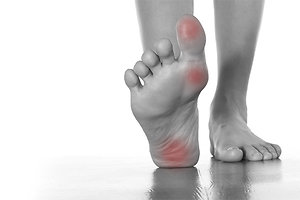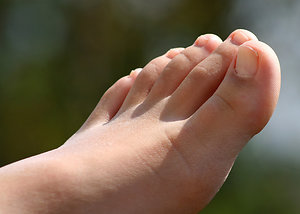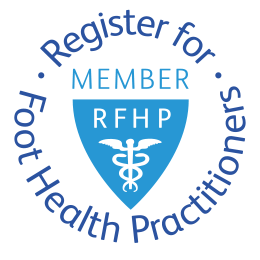Do you have trouble with....
Painful uncomfortable feet?
Athlete's Foot?
Hard Skin?
Corns?
Thickened toenails?
Don't struggle with painful uncomfortable feet, call for advice or to make an appointment.
I am fully qualified and insured, all common foot problems are treated, for example, corns, calluses, ingrown toenails etc. A nail cutting service is available too. All instruments used are thoroughly sterilised using ultrasonic cleaning and then autoclave sterilisation for your protection against infection.
Home visits are appreciated as they save the hassle associated with making a trip to town. All treatments can be carried out in the comfort of your own home, I also visit residential care homes.
Taking care of all your foot care needs including -
- Athlete's foot treatment
- Callus removal
- Corn treatment
- Diabetic Foot care
- Elderly Foot care
- Foot massage
- Hard skin removal
- Ingrowing toe nail treatment
- Regular foot care and nail cutting
- Thickened nails
Many clients book regular appointments of between 6 and 8 weeks but some request a visit on an 'as and when needed' basis.
Diabetic foot care
When you have diabetes your feet require a little extra care and attention. Diabetes can damage the nerve endings and the blood vessels in your feet, making you less likely to notice when your feet have been injured.
People with diabetes are far more likely to develop complications such as foot ulcers. Research shows that people with diabetes who take care of their feet are less likely to develop ulcers.
It is recommended you see a foot health practitioner or podiatrist twice a year for a foot health check.
Why are regular foot health checks important for diabetics?
Foot complaints are one of the leading causes for people with diabetes to be hospitalised. Circulatory problems mean that people who suffer with diabetes are at more risk of developing ulcers on their feet and legs.
Your doctor or diabetic nurse will let you know how important it is for you to maintain regular foot health checks with your foot health practitioner. These foot health checks include a vascular and neurological foot assessment.
The three main complications that are associated with a high risk diabetic patient are:
Neuropathy (reduced sensation)
Poor circulation
Risk of infection
Despite these possible problems the diabetic’s foot is quite simple to care for with just a little extra care and attention.
Diabetic daily foot care routine
I recommend you take these steps to take good care of your feet.
Check your feet every day
You should check your feet every day for any blisters, breaks in the skin, pain or any signs of infection such as swelling, heat or redness.
Wash your feet every day
You should wash your feet every day in warm water using a mild soap. Rinse your feet thoroughly and dry them carefully, especially between the toes. Do not soak your feet as this may damage your skin.
Moisturise the surrounding areas of your feet
If your skin is dry apply moisturising cream every day, avoiding areas of broken skin and the areas between your toes.
Have your toenails curbot filed regularly.
Follow the curve of the end of your toe when cutting your nails. Use a nail file to make sure there are no sharp edges, which could press into the next toe. Do not cut down the sides of your nails as they may create a ‘spike’ of nail which could result in an ingrowing toenail.
Change your socks, stockings or tights every day
There should be no bulky seams and the tops should not be elasticated.
Avoid walking barefoot
If you walk barefoot you risk injuring your feet by stubbing your toes or standing on sharp objects which can damage the skin.
Check your shoes
Check the bottom of your shoes before you put them on to make sure nothing sharp has pierced the outer sole. Also, run your hand inside each shoe to check that no small objects such as stones have fallen in. Badly fitting shoes are a common cause of irritation or damage to feet.
Check your feet for minor cuts and blisters
If you check your feet and discover any breaks in the skin, minor cuts or blisters, then cover the area with a sterile dressing. Do not burst blisters. Contact your podiatry department or GP immediately. If these people are not available and there is no sign of healing after one day, go to your local accident and emergency department.
Do not attempt to remove the hard skin or corns yourself
Do not use over-the-counter corn remedies. They are not recommended for anyone with diabetes as they can damage the skin and that can create problems.
Avoid extreme temperatures
If you have sweaty feet wear breathable shoes (e.g. trainers) change your socks and shoes frequently in summer. Bare feet can be sunburnt if not protected. In winter keep feet warm and dry.
Call or email me to discuss your foot health concerns or to make an appointment.
For further advice on the choice of shoes and a whole lot more. .. Click here



